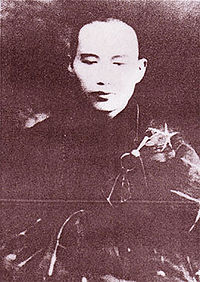Views
Dàyú 大愚
|
|
Notable Associates:
|
|
Dàyú 大愚 (N.d.) was the founder of an immensely popular lineage of Esoteric Buddhism in Republican China.
Contents |
Biography
Yú Língbō cites two sources for information on Dàyú, which do not agree. The first is by one of his most prominent disciples.
Wáng Xiānglù jūshì quánjí 王驤陸居士全集: Dàyú was from Wǔhàn 武漢. He first practiced Pure Land Buddhism, but later, while ill, he despaired at the difficulty of Buddhism and did the Pánzhōu sānmèi 般舟三昧, or pratyutpanna-samādhi. (In this practice, the practitioner recites the name of Amitabha Buddha nonstop for 70 or 90 days.) While performing this practice, the Bodhisattva Samantabhdra appeared before Dàyú and transmitted to him the 'Esoteric Method of the Inner Heart' (xīnzhōng mìfǎ 心中密法). From this encounter Dàyú became the first patriarch of the Seal-Mind School 印心宗. It said that he caused 50 to 60 thousand people to have faith in Buddhism, and his direct ("room-entering" 入室) disciples totaled around 200 people.
Tàixū dàshī zìzhuàn 太虛大師自傳: Dàyú had worked in the government as a representative from Húběi 湖北. He heard Tàixū 太虛 give a lecture on the Vimalakīrti Sūtra in Beijing in 1919, which caused him to have faith in Buddhism. He took refuge under Tàixū in Wǔchāng 武昌 in 1920, during which time he also helped Tàixū with some of his Buddhist activities. In 1923, he secretly changed into monk’s robes and went to Bǎohuá shān 寶華山 to ordain. Dàyú did not know that when you are tonsured (which he had not been at that point) you are given a lineage name. Because he had no lineage name, he had to write to Tàixū for one. Two representatives from a local Buddhist organization in Wǔhàn, along with Dàyú's parents, went to Bǎohuá shān to bring him back, but he would not come back to Wuhan. Dàyú was able to get one of the monks at Bǎohuá shān to tonsure him and he went ahead with his ordination. He and three friends changed their names to Dàyú 大愚, Dàzhì 大智, Dàyuàn 大願, and Dàbēi 大悲. After his ordination, Dàyú went into seclusion and practiced reciting the name of the Buddha. While in the depth of this practice he learned a special samādhi technique. Starting in 1926 he sought to get supernatural powers (shéntōng 神通) in order to protect people from soldiers. There are some stories about his success in this regard dating from 1927. When Tàixū came back from a trip to America in 1929, Dàyú was making a sensation all over the country with his teaching of Esoteric Buddhism, but in 1931 he went into hiding.
Important Works
- Dàyú left behind almost no written works. His most famous piece is the 解脫歌
Notable Students
References
- Yú Língbō 于凌波, ed. Xiàndài Fójiào rénwù cídiǎn 現代佛教人物辭典 (A Dictionary of Modern Buddhist Persons), 2 vols. Taipei: Foguang, 2004. Pp. 1.52b-54ba.
- 印心精舍
